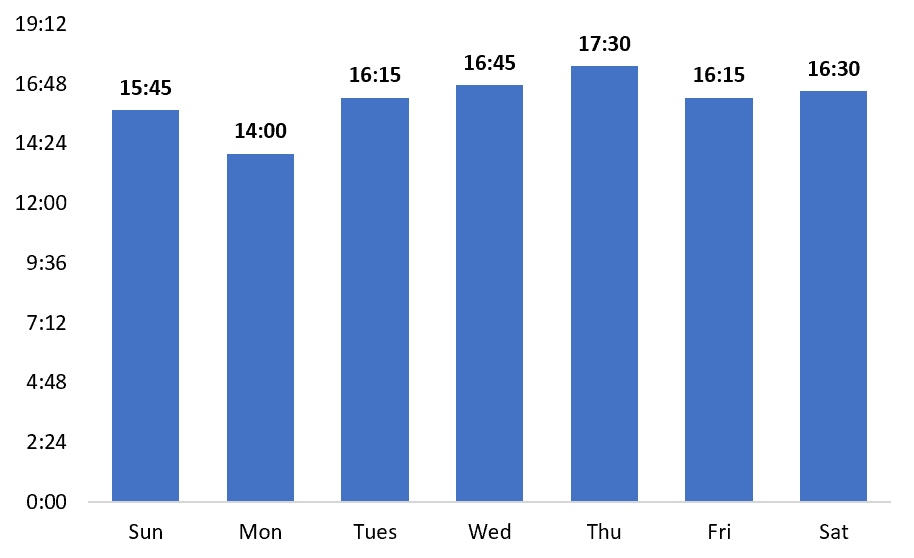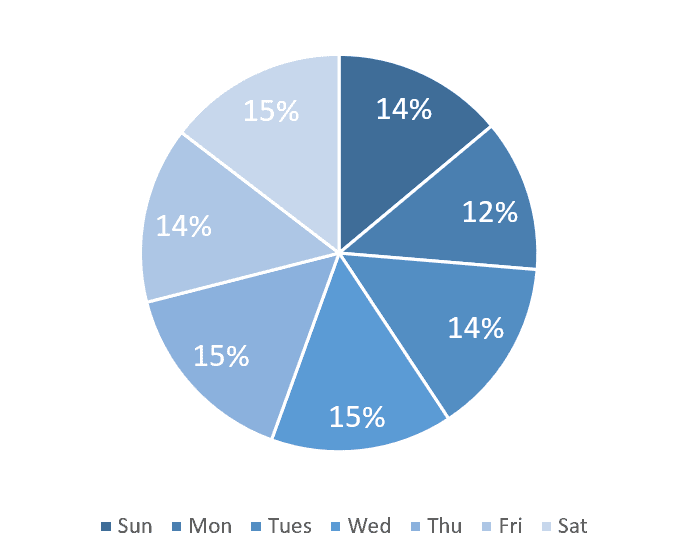English Bulldogs are renowned for their love of sleep. They often spend a significant part of their day in a state of peaceful slumber. Our own bulldog is a perfect example of this behavior.
He displays an amusing pattern: one moment, he’s energetically chasing a ball; the next, he’s soundly snoring in his bed. This led us to ponder a few questions about their sleep habits.
How many hours of sleep do English Bulldogs really need each day? Is the amount of time our bulldog spends sleeping normal, or should it be a cause for concern?
In this article, we’ll explore the sleeping patterns of English Bulldogs. We aim to provide insights for pet owners on typical sleep needs and when to be attentive to their pet’s sleeping habits.
On average, an English bulldog needs between 12 and 14 hours of sleep per day, or about 50 percent of a 24-hour period. The amount of sleep an English bulldog requires will vary by its age and level of activity. Older English bulldogs and puppies will sleep between 16 and 20 hours per day.

Sleep Requirements by Age for English Bulldogs
| English bulldog age | Hours of Sleep |
| Puppy | 18 – 20 |
| Adult | 12 – 14 |
| Senior | 16 – 18 |
English Bulldogs, known for their distinct sleeping habits, have varying sleep needs at different stages of life. Here’s a quick overview:
- Puppies (18 – 20 hours): At this youthful stage, they are bundles of energy when awake, but require extensive sleep for growth and development.
- Adults (12 – 14 hours): As they mature, their sleep needs decrease, balancing rest with their daily activities.
- Seniors (16 – 18 hours): In their golden years, they tend to sleep more, akin to their puppy days, as their bodies demand more rest.
Reflecting on Our Bulldog Puppy’s Sleep Patterns
Watching our bulldog puppy in his tranquil sleep often led me to reflect on his energetic nature while awake. It’s a striking contrast – the calm sleeper versus the lively pup. This observation sparked a question: When does an English bulldog begin to show a more relaxed demeanor during its active hours? For those curious about this transition and its timing, we’ve explored it in a dedicated post.
Tracking Our Puppy’s Sleep Schedule
To gain a deeper understanding of our bulldog’s sleeping habits, we conducted a detailed tracking of our 6-month-old English bulldog’s sleep over a 24-hour period. The insights gathered from this exercise are quite revealing. Below, we share our findings, accompanied by a comprehensive sleep log:
Cumulative Daily Sleep Duration for Our Bulldog: 15 Hours and 54 Minutes
Detailed Sleep Log:
| Midnight – 8:00AM | 8 hours |
| 10:00AM – 11:15AM | 1 hour 15 minutes |
| 1:00PM – 3:05PM | 2 hours 5 minutes |
| 3:45PM – 4:55PM | 1 hour 10 minutes |
| 6:00PM – 6:50PM | 50 minutes |
| 7:00PM – 7:25PM | 25 minutes |
| 8:50PM – 9:15PM | 25 minutes |
| 10:15PM – 11:59PM | 1 hour 44 minutes |
| Total Sleep Duration: | 15 hours 54 minutes |

In-Depth Analysis of English Bulldog Sleeping Habits
Owning an English bulldog offers a unique opportunity to delve into their distinct sleeping habits. Intrigued by our bulldog’s penchant for sleep, we embarked on a week-long observation to gather some insightful statistics on his sleeping patterns.
Key Findings from Our Week-Long Sleep Study
Throughout the week, our comprehensive tracking revealed that our English bulldog indulged in a total of 113 hours of sleep. This averages out to approximately 16 hours per day, highlighting the breed’s need for substantial rest. The data not only underscores the typical sleeping behavior of English bulldogs but also provides a benchmark for owners to understand what might be expected from their furry companions.
| Day | Sun | Mon | Tues | Wed | Thu | Fri | Sat | Total |
| Hours | 15:45 | 14:00 | 16:15 | 16:45 | 17:30 | 16:15 | 16:30 | 113 |
| % | 14% | 12% | 14% | 15% | 15% | 14% | 15% | 100% |
Tracking Z’s: A Week in the Life of an English Bulldog

A Week of Bulldog Sleep
This bar graph reveals the English Bulldog’s sleep rhythm over a week. Starting with a consistent sleep schedule, there’s a midweek rise, peaking on Thursday. It suggests the bulldog syncs its sleep with the household’s weekly cycle, resting more when the home is quieter. As the weekend nears, sleep decreases slightly, possibly due to more interaction with family members. This visual representation shows how a bulldog’s sleep adapts to its environment.
Slicing the Sleep Pie: Daily Rest Ratios of an English Bulldog

Daily Sleep Proportions
he pie chart outlines how sleep is distributed throughout the week. Mondays show a minor dip, hinting at a lively start after the weekend. The rest of the week levels out, indicating a stable routine. This suggests the bulldog’s sleep is regular but still responsive to daily changes, crucial for their wellbeing.
Sleep Spectrum: Weekly Rest Heatmap of an English Bulldog

Weekly Sleep Heatmap
The heatmap details sleep patterns, with darker blues at night and lighter blues during the day, reflecting long sleeps and short naps, respectively. The evening hours show more activity, aligning with family time. This color-coded table highlights the bulldog’s flexible sleep needs in tune with the rhythms of home life.
Keep in mind that each bulldog has its own unique sleeping patterns. Factors like age significantly influence the amount of sleep your dog needs. For instance, our English bulldog, Ollie, currently 6 months old and weighing around 45 pounds, may have different sleep needs compared to other bulldogs of the same breed but of different ages or sizes. This variability is important to consider when assessing your own bulldog’s sleeping habits.

Exploring the Reasons Behind Extensive Sleep in English Bulldogs
The question of why English bulldogs sleep so extensively remains somewhat of a mystery. A prevalent theory in canine sleep research offers some insight. It suggests that during sleep, dogs, much like humans, experience REM (Rapid Eye Movement) sleep. However, only about 10% of a dog’s sleep is in this deep, REM stage, which is crucial for maintaining overall health.
Given that bulldogs spend just a fraction of their sleep in REM, they need to sleep longer to accumulate sufficient REM sleep. This necessity explains their tendency for extended sleep sessions throughout the day. An interesting observation is that when bulldogs are in the REM phase, they might exhibit signs like eye movement or leg twitching, indicating they are in a deep sleep state.
Understanding Sleep Patterns of English Bulldog Puppies
The sleep requirements of English bulldog puppies are notably high, especially during their critical growth phase, which spans from birth up to 18 months. During this period, these puppies typically need about 18 to 20 hours of sleep each day. This extensive sleep is crucial for their development for several reasons.
Firstly, bulldog puppies are incredibly active and energetic when awake. Their bursts of play and exploration consume a lot of energy, necessitating extended periods of sleep for recovery and rejuvenation.
Secondly, this is a period of rapid growth and development. During sleep, vital physiological processes take place, contributing to the puppy’s physical and cognitive development. Adequate sleep is essential for puppies to grow into strong, healthy, and intelligent adult bulldogs.
Therefore, it’s important to respect their need for sleep and avoid disturbing them during these crucial rest periods. As the saying goes, “Let sleeping dogs lie,” especially when they are bulldog puppies growing and developing at a remarkable pace.
Sleep Requirements for Middle-Aged English Bulldogs
As English Bulldogs transition into their middle years, typically between the ages of 3 and 6, their sleep patterns undergo a noticeable shift. During this stage of their life, you can expect your bulldog to average around 12 to 14 hours of sleep per day. This change reflects a balance between rest and activity that is crucial for maintaining their health and well-being.
Sleep during this phase is characterized by a mix of nightly rest and numerous short naps throughout the day. Unlike their puppy years, when sleep dominates their routine, middle-aged bulldogs have a more diversified daily schedule. Typically, a bulldog in this age group will spend about 50% of their time sleeping, 30% lounging or relaxing in a state of mild activity, and the remaining 20% in active, energetic pursuits.
This balance is essential for their overall health. Adequate sleep continues to play a vital role in their physical and mental well-being, while the periods of activity and lounging are important for keeping their muscles toned, joints flexible, and minds engaged.
Understanding this shift in sleep patterns is crucial for bulldog owners. It allows for the creation of a daily routine that aligns with their pet’s natural rhythms, ensuring they receive the right mix of rest, relaxation, and activity.
Sleep Patterns in Senior English Bulldogs
As English Bulldogs advance into their senior years, typically around the age of 7 or 8, their sleep requirements significantly change, mirroring the patterns observed in their puppyhood. Senior bulldogs often need as much sleep as they did when they were puppies, a shift that is both interesting and essential for their health.
In their golden years, bulldogs may sleep for durations akin to those of a young puppy, often requiring around the same 18 to 20 hours of rest per day. This increase in sleep is a natural response to the aging process. Just as in humans, older bulldogs experience changes in their energy levels and physical capabilities, leading to a greater need for rest and recovery time.
Sleep becomes a crucial component of a senior bulldog’s daily routine. The additional rest helps to conserve their energy and supports their overall well-being. It also plays a vital role in managing age-related changes and discomforts, such as joint stiffness or general weariness.
For bulldog owners, understanding this shift in sleep needs is critical. It allows for adjustments in daily routines and expectations, ensuring senior bulldogs have a comfortable and restful environment that caters to their increased need for sleep.
Respecting and accommodating these changing sleep patterns is a key aspect of caring for a senior bulldog, helping to maintain their quality of life as they gracefully age.
Daily Sleep Patterns of English Bulldogs
Understanding when English Bulldogs typically sleep helps owners better accommodate their pet’s natural rhythms. Generally, bulldogs enjoy a sound, uninterrupted night’s sleep lasting about 7 to 8 hours. This nighttime rest is crucial for their recovery and well-being, providing them with the deep, restorative sleep they need.
In addition to their nighttime slumber, bulldogs also take several naps during the day. These daytime naps are interspersed throughout their schedule, cumulatively totaling around 5 to 7 hours. Unlike the deep sleep experienced at night, these naps tend to be shorter and lighter, allowing the bulldog to recharge before their next bout of activity or interaction.
The pattern of a solid block of sleep at night followed by multiple naps during the day aligns well with the bulldog’s overall energy levels and lifestyle needs. It’s a natural sleep cycle that supports their health and keeps them alert and active during their waking hours.
For bulldog owners, recognizing this sleep pattern is essential. It helps in planning the dog’s daily routine, ensuring that there are quiet periods for these important naps, and maintaining a peaceful environment at night for their longer, uninterrupted rest.
Weekly Sleep Variations in English Bulldogs Based on Owner Availability
The daily sleep patterns of English Bulldogs can significantly vary based on the weekly routines of their owners. Interestingly, these dogs tend to adapt their sleep habits to align with the presence or absence of their human companions.
During weekdays, typically from Monday to Friday, when many owners are away for work, English Bulldogs often experience their longest periods of sleep. The quiet, less active household environment during these days naturally encourages them to indulge in more extended sleep sessions.
Conversely, on weekends or other days when owners are more likely to be home, bulldogs adjust their sleeping schedule accordingly. The increased interaction, activity, and presence of their owners motivate them to stay awake for longer stretches. This leads to a decrease in their overall sleep time as they engage more in play and companionship.
This adaptable sleeping behavior highlights the bulldog’s social nature and their tendency to synchronize their routines with those of their human family members. It underscores the importance for owners to understand how their schedules and daily activities can directly impact the sleep and overall well-being of their bulldog.
When should you be concerned with your English bulldogs sleep?
While it’s normal for English Bulldogs to enjoy ample sleep, sudden and unexplained changes in their sleeping habits can be a cause for concern. It’s important to monitor these changes, especially if they occur without any obvious reasons such as an exceptionally active day.
If you observe a significant deviation from your bulldog’s usual sleep routine, it may be prudent to consult with your veterinarian. Such changes can sometimes indicate underlying health issues, including viral or bacterial infections, or even more serious conditions like cancer. Keep an eye out for accompanying symptoms that could signal a problem:
- Uncharacteristic bathroom accidents inside the house
- Changes in appetite, either a decrease or complete loss
- Reduced frequency in play or lack of interest in usual activities
- Coughing, vomiting, or sneezing
- Diarrhea or other gastrointestinal issues
- Audible signs of discomfort or pain, such as whimpering
- Abnormal water consumption, either too little or too much
- Overall lethargy or lack of energy
English Bulldogs are known for their vibrant personalities and their love for sleep. As a responsible owner, allowing them their needed rest without interruptions is crucial. Understanding and respecting their sleep needs is key to maintaining their happiness and well-being.
Remember, when a bulldog decides it’s time to sleep, they’re fully committed to their rest. It’s a natural part of their routine, and trying to wake them can be challenging. Ensuring they have a comfortable and peaceful sleeping environment is the best way to support their health and happiness.
